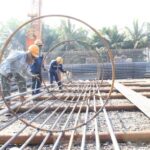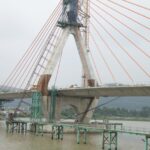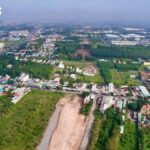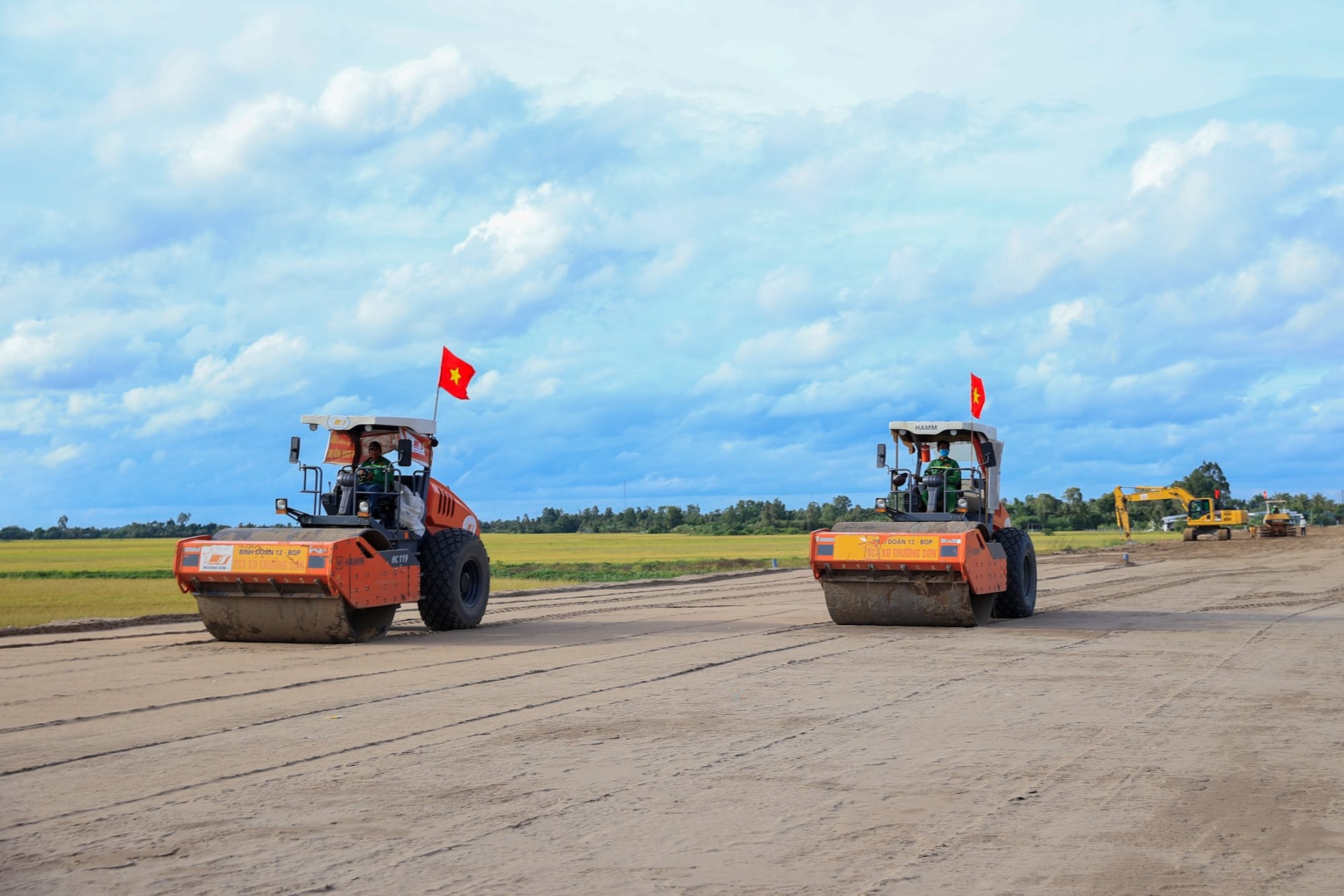
Over 450 construction units, 6,500 workers, and 2,200 equipment have been mobilized by contractors so far, matching the construction conditions in the Mekong Delta region (Photo: VGP)
Most of the projects in the Mekong Delta region are behind schedule, ranging from 4% to 15%, mainly due to a shortage of suitable filling sand.
At a conference held on October 16th to address challenges and promote infrastructure development in the Mekong Delta region, Deputy Minister of Transport Nguyen Duy Lam reported to Prime Minister Pham Minh Chinh that land clearance for the expressway projects under construction has reached over 99%, basically meeting the construction schedule.
The Ho Chi Minh Road project, however, has not met the construction requirements, with land clearance at 56% in Kien Giang province and 82% in Bac Lieu province. The Cao Lanh-Lo Te project also faces obstacles in land clearance at the Lo Te intersection in Can Tho city.
“Despite the efforts of the local authorities, land clearance has not been completed as required by the Prime Minister by September 2024,” said Deputy Minister Nguyen Duy Lam.
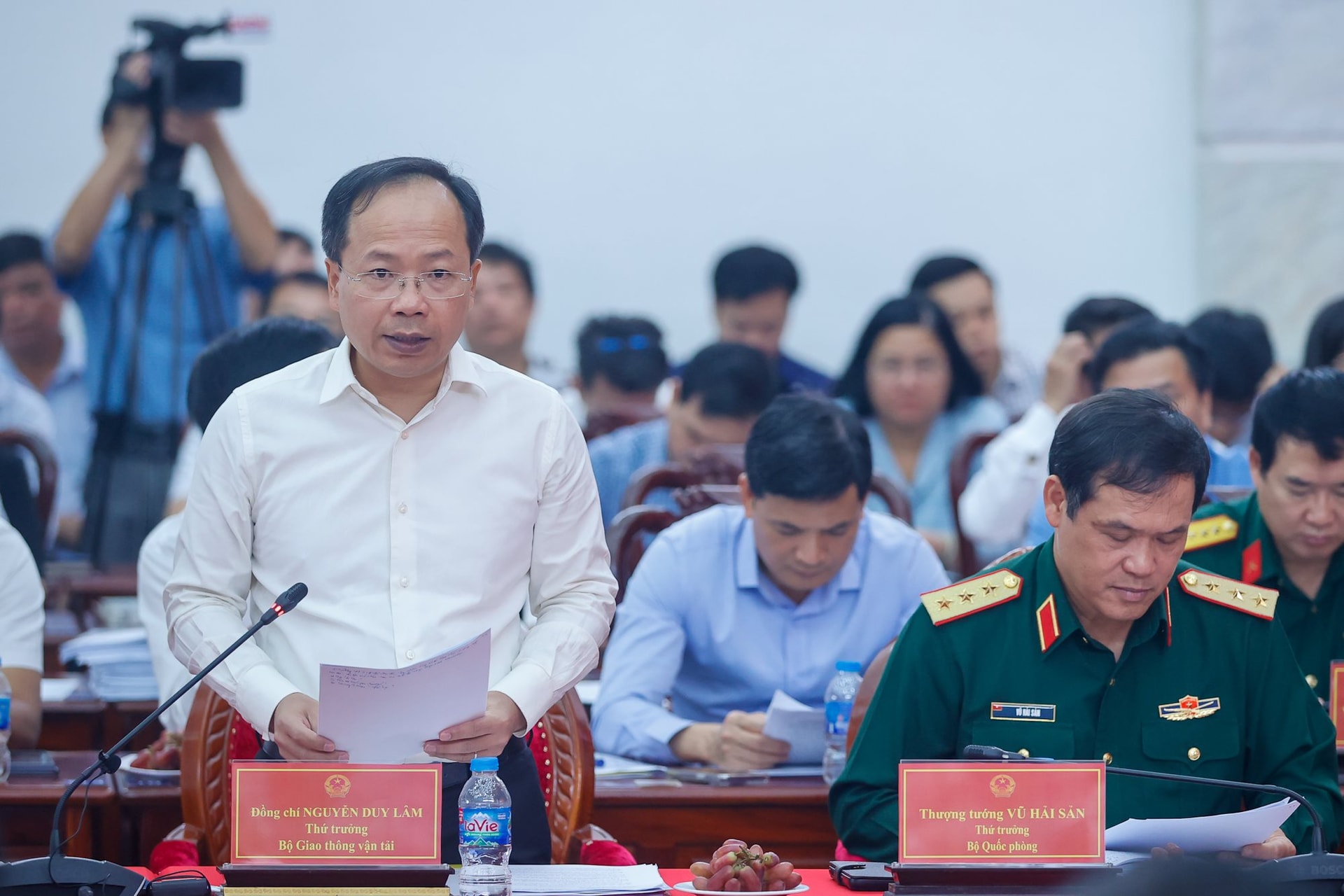
Deputy Minister of Transport Nguyen Duy Lam at the Conference on October 16th – Photo: VGP/Doan Bac
Regarding the construction deployment, contractors have mobilized a total of 450 construction units, 6,500 workers, and 2,200 pieces of equipment so far, matching the construction conditions in the Mekong Delta region
(specifically, the Can Tho-Ca Mau project has mobilized 183 construction units, 971 equipment, and 3,000 workers).
However, most of the projects are behind schedule, ranging from 4% to 15%. The main reason is a shortage of suitable filling sand, which has led to significant waste of time and resources for the contractors, affecting the construction efficiency and completion schedule of the projects.
According to the Ministry of Transport, the Can Tho-Ca Mau and Ho Chi Minh Road projects need to complete the load test by December 31st, 2024, to meet the project completion deadline of December 31st, 2025.
“However, the Can Tho-Ca Mau project is currently only supplying 54,000 cubic meters of filling sand per day, out of the required 76,000 cubic meters. As for the Ho Chi Minh Road project, only the bridge construction and organic excavation are underway as the procedures for mine allocation have not been completed. Therefore, if the material supply for these projects is not promptly supplemented to meet the required capacity by October 2024, it will be challenging to adhere to the schedule,” said Deputy Minister Nguyen Duy Lam.
Regarding the allocated capital for the projects, the Ministry of Transport affirmed that the capital basically meets the construction schedule. Specifically, the Cao Lanh-An Huu project requires an additional VND 250 billion, which the province of Dong Thap is balancing from local sources. The Rach Mieu 2 Bridge project needs an additional VND 1,192 billion, for which the Ministry of Transport has sent a document to the Ministry of Planning and Investment and the Ministry of Finance for resolution.
Challenges in implementing projects in the Mekong Delta region
Speaking about the difficulties in implementing projects in the Mekong Delta region, Deputy Minister of Transport Nguyen Duy Lam reported that during the implementation of the projects, the Ministry of Transport and local authorities have always received the attention and strong direction of the Government, the Prime Minister, and Deputy Prime Minister Tran Hong Ha.
The Prime Minister has personally inspected the project sites and worked with local authorities five times to provide directions and policies to overcome obstacles and promote the progress of the projects.
However, the supply of filling sand remains a challenge. Although the procedures for river sand mining permits have been completed, the mining capacity of the mines is limited and cannot keep up with the construction schedule. Additionally, despite the Prime Minister’s instructions, the procedures for mine allocation in the provinces of Tien Giang, Ben Tre, Vinh Long, and Soc Trang have not been completed in time to meet the construction schedule.
Furthermore, many mines in Tien Giang, Ben Tre, and Soc Trang provinces were found to have overlapping claims with inland waterways and their protective corridors during the survey and evaluation of quality and reserves. Some mines in Ben Tre province were allocated to contractors but fall under the mineral exploitation planning period of 2026-2030.
The organization of sea sand mining in Soc Trang province to serve the construction of the Hau Giang-Ca Mau Expressway is currently producing approximately 15,000 cubic meters per day. While the contractors have mobilized a maximum of resources and equipment from across the country, the low water level means that only small-capacity ships can be used, and the work is heavily dependent on weather conditions.
Unlocking Investment Opportunities: Binh Duong’s ‘Transport-Led Development’ Strategy
By prioritizing investment in its transportation infrastructure, Binh Duong Province has successfully attracted a significant number of investors. Currently, the province boasts an impressive 71,776 domestic enterprises with a total registered capital of 786 trillion VND, along with 4,347 foreign-invested projects totaling 42 billion USD in registered capital.
Mobilizing Over 6,500 Workers and 2,200 Equipment, Most Transport Projects in the Mekong Delta Are Still Delayed by 4-15% Due to One Main Reason
The Mekong Delta region is currently undertaking nine significant national transportation projects, totaling an impressive investment of 106,000 billion VND. Of these ambitious ventures, eight are already under construction, with the My An – Cao Lanh Expressway (funded by South Korean ODA) undergoing final procedural refinements ahead of its anticipated launch in early 2025.
The $65 Million Bridge in Bac Giang Province: The Thuân An Corporation’s ‘Missed’ Deadline
This week, a vice-chairperson of the Bac Giang Provincial People’s Committee is expected to meet with relevant stakeholders to address challenges and accelerate the progress of the Dong Viet Bridge project. This initiative is linked to the Thuân An Group, and the local government’s intervention aims to facilitate its timely completion.

